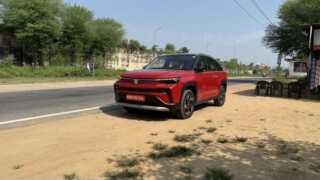Follow us today…
For many EV owners, the comparison to gas-powered cars has created some very strong preferences. From the instant torque to the joy of skipping gas stations, people are sharing what makes EVs not just practical, but deeply satisfying. Driving standards are definitely changing. The comparisons are rolling in, and sparking lively wave of commentary across social media.
This has led to a lot of interesting social media buzz about driving gas-powered vehicles versus the EV experience. Here’s a recent, thoughtful post on Reddit by Com4734 with a ton of responses from other drivers making the comparison.
“We just got home yesterday I’m taking a road trip from Pennsylvania to out west. Utah, Wyoming, South Dakota, etc. We rented a vehicle with 3 rows (ended up being a Dodge Durango) to have more room for our stuff and our dogs, and because we didn’t want to put all those miles on either of our vehicles. All I can say is holy crap, I am glad to be back home and not have to drive that thing anymore. Compared to other ICE vehicles, it drove fine, but compared to our EVs, it was night and day. The noise and vibration was immediately noticeable as soon as I got in. My husband even thought a window was opened because there was so much noise from the drivetrain and probably less sound insulation in general.
The biggest thing was the transmission’s constant gear shifting. There was one situation where I was trying to pass a tractor-trailer that kept swerving a bit into the left lane and then onto the shoulder and back. I got into the passing lane and sped up a bit to pass it. It then started to swerve into our lane a bit so I floored the accelerator pedal. Literally a full second went by until the transmission shifted into a lower gear and another full second went by before it started to pick up speed. Had the semi kept coming into our lane it would’ve hit us. Had I encountered that same situation in my Optiq or my husband’s EV6, we would’ve almost instantly shot past the semi and been ahead of it.
Another thing was being gassed by the exhaust when we had the vehicle on to cool it down and had the lift-gate open to get the dogs in the back. Oh and not having one pedal driving and regen was mildly annoying as well. When we were going downhill in the Rocky Mountains I would think about all the energy we were wasting by using the brakes instead of being able to put it back in the battery.”
johncuyle responded with a comment about driving their beloved gas-powered car:
“I daily a 2024 500e EV and weekend a 1994 Corvette or a 2024 Corvette. The 500e is a much better around-town appliance. I don’t have to worry about warming it up, approach angles to driveways, parking it, someone dinging it, getting it dirty, etc. and I never need to stop at a gas station. An EV for the week and an ICE for when driving actually matters, is the way to go.”
FunInception added:
“I didn’t purchase my EV to save money or because it is better for the environment. I purchased it because, like you said, the drive quality is a million times better, and I hate going to the gas station and love the ability to charge at home.”
After reading many (and I mean many) social media comments about owning electric vehicles, I see the following consensus.
Home Charging Is Usually a Must-Have, Not a Nice-to-Have
Installing a 240-volt outlet at home dramatically improves the EV experience, but this is not feasible for most renters or apartment dwellers. Charging an EV using a standard 110-volt outlet can take over 24 hours for just 40 miles of range. The disparity in home charging accessibility creates a fundamental barrier for millions who do not own their residence. A large-scale shift to electric vehicles will require major upgrades in housing infrastructure to support practical, overnight charging.
Performance Is a Huge Smile Inducer, Cold Weather Isn’t
EVs deliver outstanding acceleration and maintain power at higher elevations, which improves highway driving. However, battery performance suffers in extreme temperatures. Without battery pre-conditioning systems, range losses can be significant in the cold. Many EVs fail to include this feature, leaving drivers with less-than-promised mileage. This temperature sensitivity contrasts with gas vehicles, which remain more consistent in performance regardless of climate. If you live in a cold climate and are considering buying an EV, be sure to look into the battery pre-conditioning system on the cars that you are considering.
The Cost of Ownership Difference is a Gaping Chasm
The cost of owning an electric vehicle is dramatically lower compared to a gas-powered car. Charging an EV is significantly cheaper than constantly filling up with gasoline, especially if you charge at home. Regenerative braking means brake pads last far longer, often going years without replacement. There are no oil changes to worry about, no spark plugs to replace, and no exhaust systems to rust out. Electric vehicles have far fewer moving parts, which means fewer things can go wrong and fewer trips to the mechanic. An electric vehicle (EV) driver can save $6,000 to $10,000 over the course of 50,000 miles compared to owning a gas-powered car
Advertising
Tesla’s Range and Charging Seems to be at The Head of the Pack
Tesla seems to be leading due to its long range and extensive Supercharger network. Most Tesla models exceed 300 miles of range, which proves essential for those with long daily commutes. In contrast, other EVs with sub-250-mile ranges introduce anxiety and sometimes consume time. Although slowly improving, public charging infrastructure outside of Tesla’s network is still proving to be unreliable and often unusable. This shows the critical importance of a well-functioning, accessible charging network for broader EV adoption.
While We’re at it, Let’s Dig Into the Huge Efficiency Differences Between EV and ICE
The difference in efficiency between electric vehicles like the Kia EV6 and gasoline vehicles is huge. EVs represent a leap forward in how energy is used in transportation. From direct motor efficiency to regenerative braking and the benefits of clean power, electric vehicles dramatically reduce energy waste. As the world continues to shift toward cleaner and smarter transportation, recognizing and debunking myths is essential. Every mile driven in an EV is a step toward a more energy-responsible future. There are several specific reasons why EVs are much more efficient than gas-powered vehicles.
1) Motor Efficiency
Electric vehicles turn electricity directly into motion, bypassing the inefficiencies of internal combustion. While a gasoline-powered engine needs to burn fuel to generate heat and convert that heat into mechanical energy, an EV delivers power with far less loss. On average, an electric vehicle converts over 70 percent of its input energy into movement. In contrast, even the most efficient gasoline engines typically operate at less than 30 percent efficiency, meaning most of the energy from gasoline is wasted as heat and vibration. This foundational advantage is what makes EVs far more efficient from the moment they are powered on.
2) Regenerative Braking: Capturing Energy Without Burning up Your Expensive Brake Pads
Electric vehicles also excel at preserving energy during braking. Unlike conventional cars that turn kinetic energy into waste heat through brake pads, EVs use regenerative braking systems to send that energy back into the battery. This energy can then be reused to accelerate the car again. The result is less brake wear, lower maintenance costs, and up to 80 percent of braking energy being reused instead of discarded. Traditional vehicles not only lose energy when stopping but also incur added wear and tear that leads to more frequent service and part replacements.
3) Charging Efficiency and Power Source Impact
Charging an EV is more efficient than burning gasoline, even when the electricity comes from fossil fuel sources. The combined losses from power generation, battery charging, and drivetrain components in EVs are typically between 20 to 30 percent. In contrast, internal combustion engines waste as much as 76 to 84 percent of the energy in gasoline. When EVs are powered by clean energy sources like solar or wind, overall energy loss is minimal. Even if all electricity came from coal-fired plants, EVs would still consume significantly less energy than gas-powered cars, reducing the energy demand for transportation by about 31 percent.
Conclusion and a Comment about Disinformation
Most comment that EVs are delightful to own, but under the right conditions. Those who can install home chargers enjoy a seamless, modern driving experience. However, for some, charging infrastructure gaps, and housing limitations create significant hurdles. Until these issues are resolved, EVs will remain the domain of the few rather than the many. Solving affordability and charging accessibility will be key to transitioning to electric mobility.
Despite the clear efficiency advantages of EVs and how much people prefer to drive them over gas-powered cars, recent misinformation campaigns have tried to portray electric cars as more expensive or less efficient to operate. Much of this stems from social media channels chasing engagement/clickbait and the fossil fuel industry desperately trying to extend their cashflow. These narratives ignore the overwhelming real-world data supporting the superior efficiency of electric vehicles. Encouraging accurate, fact-based education is crucial to countering these false claims and helping more people make informed decisions. Be kind, tell the truth about your EV experiences, and more folks will make the switch.
Please Drop Your Thoughts in the Comments Below
Was there a specific moment that made you decide you’d never go back to gas?
How much money have you saved in maintenance or fuel since switching to an EV?
Chris Johnston is the author of SAE’s comprehensive book on electric vehicles, “The Arrival of The Electric Car.” His coverage on Torque News focuses on electric vehicles. Chris has decades of product management experience in telematics, mobile computing, and wireless communications. Chris has a B.S. in electrical engineering from Purdue University and an MBA. He lives in Seattle. When not working, Chris enjoys restoring classic wooden boats, open water swimming, cycling and flying (as a private pilot). You can connect with Chris on LinkedIn and follow his work on X at ChrisJohnstonEV.
Image sources: Kia media kit, Tesla media kit
Follow us today…
Source: torquenews.com








